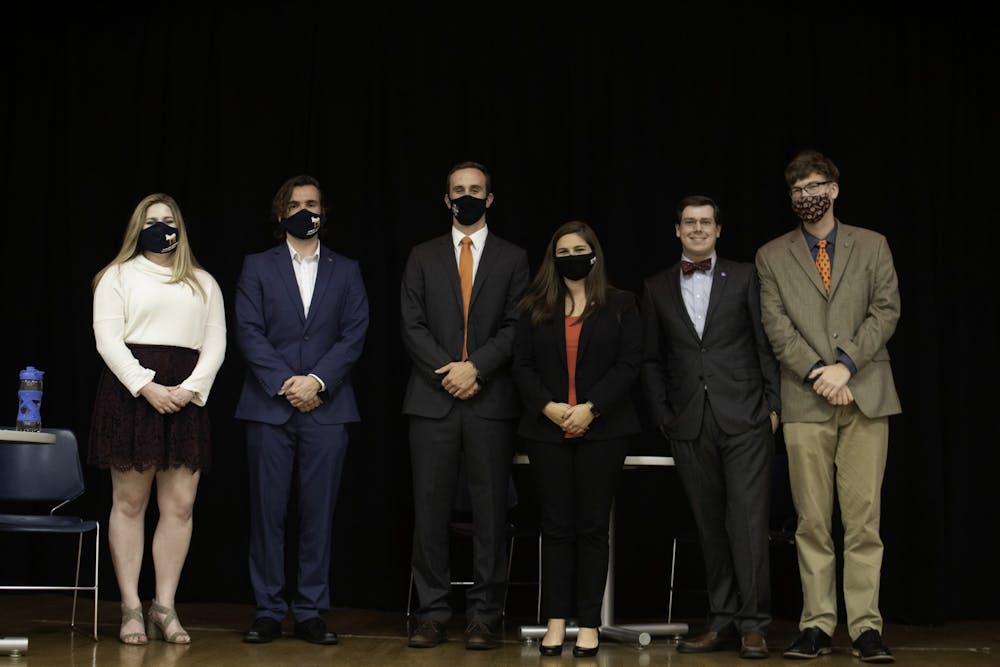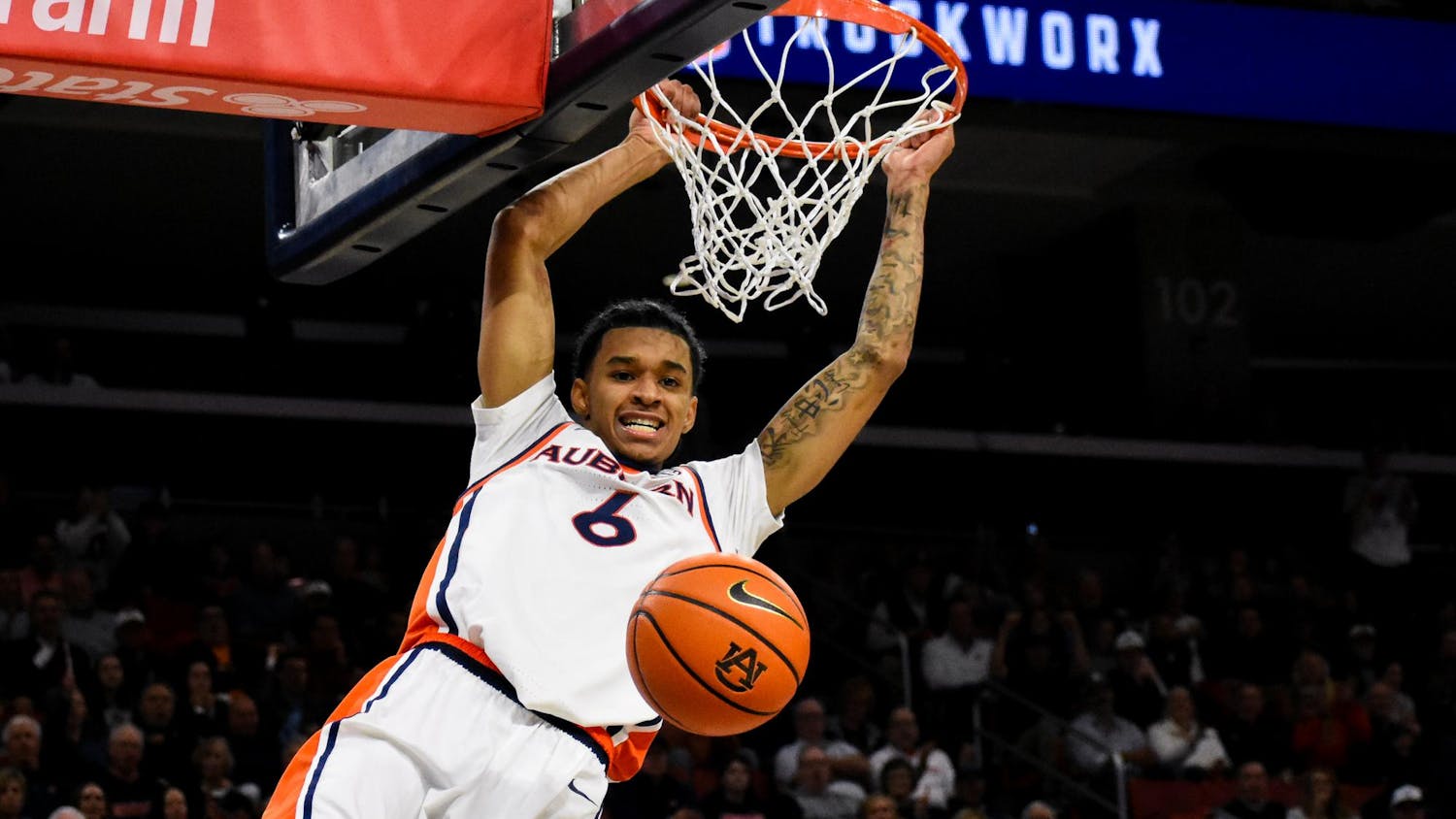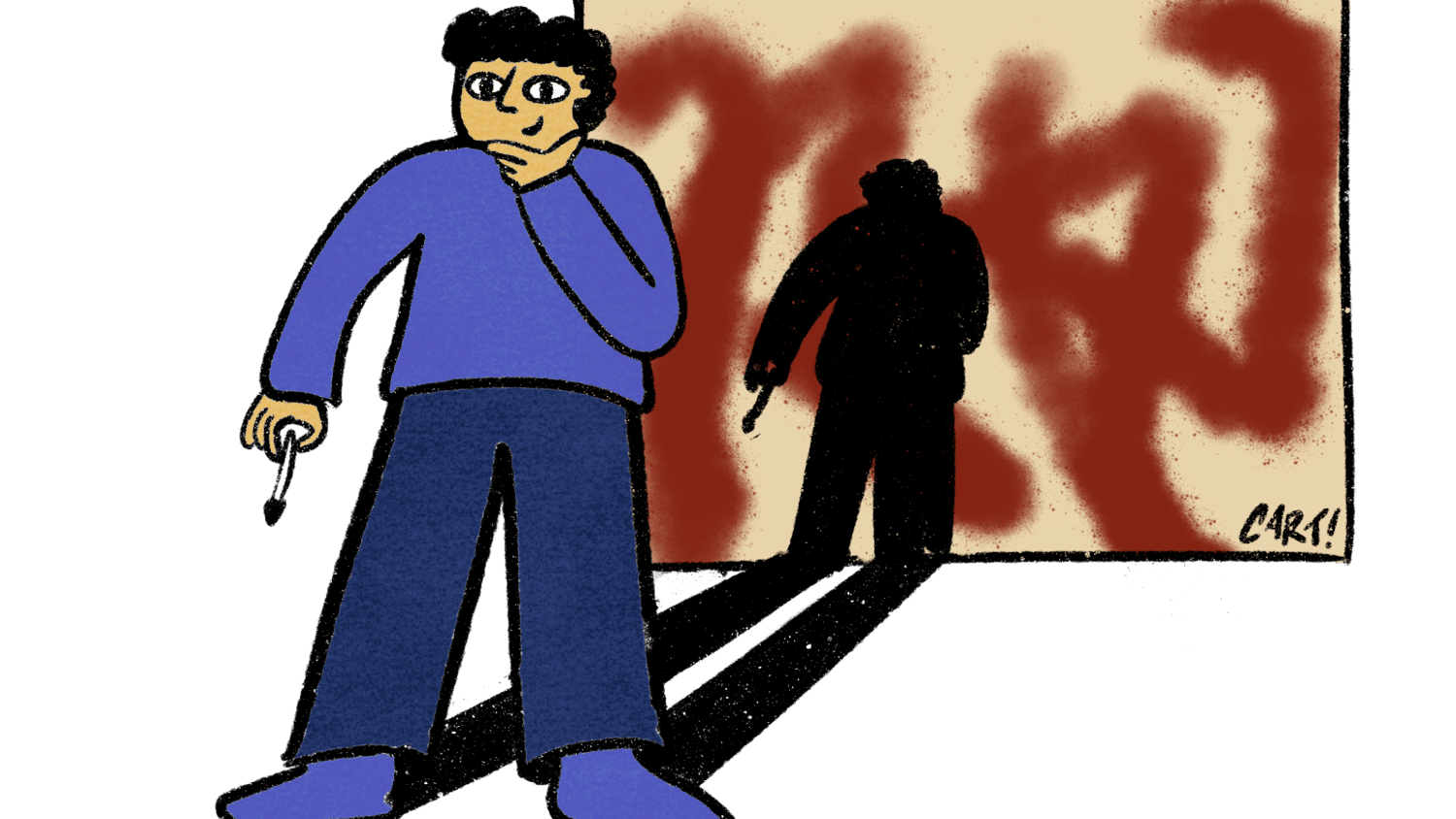Three political student organizations congregated in Foy Auditorium on Tuesday night to debate current issues — one week ahead of the 2020 U.S. presidential election.
The Auburn University College Democrats, Auburn University College Republicans and Young Americans for Liberty at Auburn University each selected two members of their respective bodies to argue their stances on four questions in addition to several questions from the audience.
Plainsman editors Jack West, senior in history and journalism, and Natalie Beckerink, senior in political science, moderated and posed each question to the speakers. In accordance with University guidelines, the three organizations were physically distanced on stage at their own table and asked to wear masks.
Some uncertainty was raised at the beginning of the debate on the mask policy, wherein the representatives of the YAL stated they were informed by representatives of the other political groups in a Zoom meeting prior to the debate masks would not be required. Troy Beckham, senior in materials engineering and one half of the YAL’s delegation, was unable to produce a mask after a request from the moderators, but the debate began nonetheless.
Throughout the COVID-19 pandemic, social media platforms, namely Twitter and Facebook, have left notes on posts that might contain misinformation about the coronavirus. The first question asked members what role they believe these sites should play in controlling content on their platform.
Following the death of George Floyd, a Black man killed by Minneapolis police officers in May, largely peaceful protests focused on the Black community and police erupted across the nation, including in Auburn. The second question asked members what role they believed protests, police departments and elected officials should play in addressing America’s history of slavery and segregation.
In many rural areas of Alabama, some towns or counties have no hospitals or clinics. If the state accepted federal funding to expand Medicaid, 324,000 more Alabama citizens would have health insurance, according to publichealth.org. The third question asked members how they believed the state could best serve its citizens’ healthcare needs.
Alabama Gov. Kay Ivey implemented a statewide mask order in July ahead of surrounding states. She was criticized by Alabamians such as Lt. Gov. Will Ainsworth, who has since contracted the virus. The final question asked members whether they believed the state has done enough to fight the virus or has done too much. It also asked them what role they think the federal government should have in fighting the coronavirus.
Those in the audience were allowed three questions for the debate. The first question asked organization representatives what they thought the biggest political issue affecting Auburn students is and what they would do about it. The College Democrats and Republicans named the economy, and both said COVID should not be politicized. YAL named the pandemic and thinks higher education institutions should return to in-person instruction.
The second asked groups if they believe felons who have finished their sentence should have the right to vote. Convicted felons in Alabama are not permitted to vote, even after finishing their sentence. All parties agreed this right should be granted, with YAL adding that gun rights of nonviolent felons should also be reinstated.
The final question from the audience asked members what the best way for students to become politically active and make a change in Auburn is. It also asked why becoming active is important. The members said joining not just one of their groups, but joining all of them is beneficial. They also suggested joining campaign trails and single-issue or activist clubs in addition.
Below is a summary of each political student organization’s positions on the main four issues. A recorded livestream of the full debate is available for viewing on The Plainsman’s Facebook page.
Auburn University College Democrats
The College Democrats said social media sites have a moral responsibility to ensure users on their sites do not spread misinformation about COVID-19, therefore necessitating links on some posts they determine to be false. They believe agencies such as the Centers for Disease Control and Prevention can best keep Americans informed, as sometimes misinformation may be facts that became outdated.
On this year’s racial protests, the College Democrats said protestors are constituents whose job is not to develop perfect solutions but to bring awareness to issues they see in government — which the police are an arm of. They said it is then the role of legislators to listen and implement solutions.
Joelle Woggerman, sophomore in biochemistry, said there are many other less extreme proposals raised by protestors than the idea of “defunding the police.” The College Democrats said more response from the government is necessary and that they were frustrated only one officer has been charged in the case of Breonna Taylor, a Black woman in Kentucky killed by police during the excecution of a no-knock warrant.
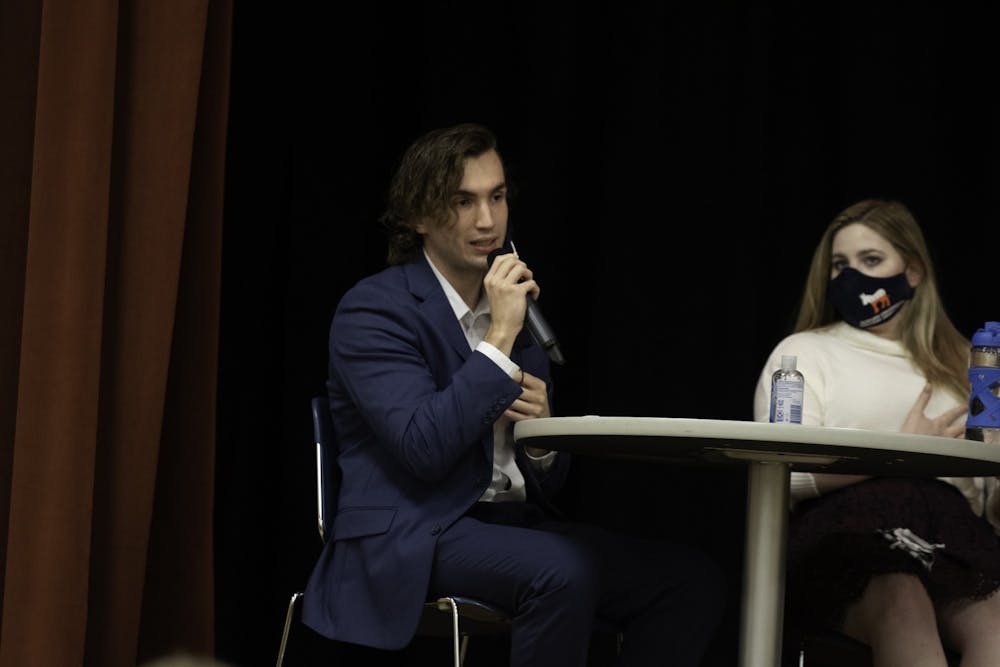
Carsten Grove (left) and Joelle Woggerman (right) represent the College Democrats during the 2020 Great Debate on Oct. 27, 2020, in Auburn, Ala.
Medicaid coverage should be expanded in Alabama, the College Democrats said. Carsten Grove, senior in industrial systems engineering and president of the Auburn University College Democrats, said 53rd Gov. Robert Bentley rejected this proposal during his term. Since 2010, seven rural hospitals in Alabama have closed, with 17 at risk for closure, Grove said. Expanded Medicaid would cost the Alabama taxpayer $168 million the first year of implementation and $50 million in the years following, the College Democrats estimate out of a $26.4 billion budget.
The College Democrats commended Gov. Ivey for her early mask order, but they said predicted rises in COVID cases going into the winter means the state should also make use of federal resources pertaining to the virus to ensure citizens stay safe. They argued for continued pandemic guidelines enforced such as mask wearing and physical distancing, citing Sweden as an example of how a laissez-faire approach was detrimental to its economy.
“Sweden did virtually no measures to contain this virus, unlike all of their surrounding countries,” Woggerman said. “Sweden had 12 times more deaths than neighboring Norway.”
Auburn University College Republicans
The College Republicans said social media sites should not be “arbiters of truth” in correcting misinformation and that viewers should determine truth rather than these mediums. They consider free speech on social media to be a right whether true or false, and they said leaving warnings amounts to censorship.
Protesting police and racial injustice is a constitutional freedom, the College Republicans said, but they believe the idea of “defunding the police” is a hasty reaction to greater issues. They proposed alternatives such as increasing training, creating higher levels of accountability and transferring city departments to county authority. Defunding departments would cause crime to increase, they argued.
“According to the Minneapolis Police Department’s data, in September 2020, violent crimes were up 17% from the previous five-year average in Minneapolis,” said Conner Ettmuellet, fifth-year senior in professional flight. “They were up 30% in higher-income neighborhoods, shootings and stabbings up 25% [and] robberies up 11%.”
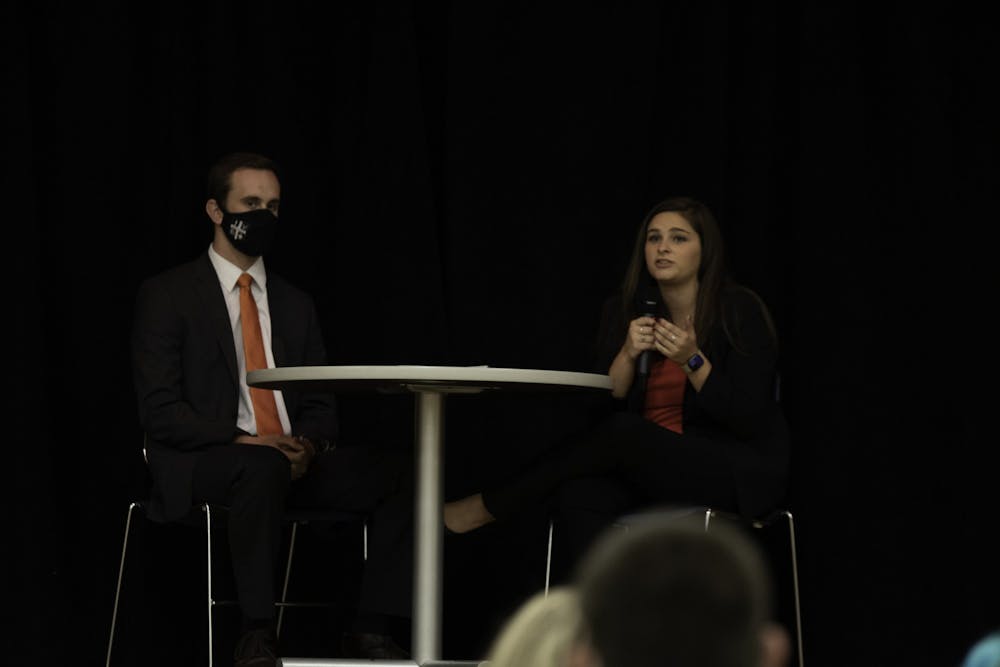
Conner Ettmuellet (left) and Lydia Maxwell (right) debate on behalf of the College Republicans in the 2020 Great Debate on Oct. 27, 2020, in Auburn, Ala.
The College Republicans do not support Alabama expansion of Medicaid, arguing there are public health institutions in all 67 counties, saying state funding should go toward other initiatives like education. Additionally, they said socialized healthcare in Quebec in Canada caused wait times to increase. Expanding Medicaid would suffocate the healthcare market, the College Republicans said, as they think resources would be taken away from rural communities in favor of urban centers.
“The money isn’t going to spread evenly, it’s going to go to these more populated areas because that’s where most people are and that’s where you’ll see the most help is needed,” said Lydia Maxwell, senior in communication and president of the College Republicans.
The mask order implemented by Gov. Kay Ivey was needed to curb COVID-19 numbers, the College Republicans said. They referenced comments from White House Coronavirus Response Coordinator Dr. Deborah Birx during her Auburn visit as proof. However, they believe such orders should be state-dependent issues rather than managed at the national level because the U.S. was founded on principles of federalism.
Young Americans for Liberty at Auburn University
The Young Americans for Liberty questioned misinformation flags on social media sites in general, asking whether site employees or government consultants determine the threshold for accuracy. They criticized YouTube for not applying misinformation flags about content on China’s Uighur detention camps like other sites such as Twitter and Facebook. YAL said it should be the choice of individual companies on whether they want to apply these flags; however, they said in doing so sites become publishing websites.
“They either need to go all in ... regulating everything that gets posted on their website ... or they need to say none of it’s going to be vetted,” said Ian Ramsden, junior in materials engineering and president of YAL.
In line with protestors, YAL is against police militarization, qualified immunity and no-knock warrants. They mentioned reports that the Auburn Police Division possesses an MRAP vehicle and disagree such a military vehicle is needed by a police force. They also brought up the case of an officer in Texas who walked into what she thought was her apartment and shot the resident inside, fearing they were an invader. YAL was critical of riots that have flared up amid peaceful protests, saying that these can affect voters’ and legislators’ mindsets on an issue even if they are the minority of demonstrations.

Troy Beckham (left) and Ian Ramsden (right) speak for the Young Americans for Liberty in the 2020 Great Debate on Oct. 27, 2020, in Auburn, Ala.
YAL disagreed with the proposal of expanding Medicaid in Alabama. They believe expansion in other states correlates to why rural hospitals close, as Beckham said subsidized increases prices and thus makes competition more difficult.
Gov. Kay Ivey overstepped her state constitutional bounds in implementing the mask order, YAL said. They said this law should have been passed by legislators, as they said citizens have the right to wear the clothing they want including masks, and should not be required to by the state. They also asked where the line will be drawn in declaring the national COVID emergency over, saying that 61,000 Americans died last flu season.
“Right now we have 230,000 deaths of COVID, at least that’s the last statistic I saw,” Ramsden said. “61,000 people is still three to four times less than what we have. If masks still help, why didn’t we implement a mask mandate when [flu season] happened?”
Do you like this story? The Plainsman doesn't accept money from tuition or student fees, and we don't charge a subscription fee. But you can donate to support The Plainsman.

Tim Nail, junior in journalism, is the campus editor for The Auburn Plainsman.

